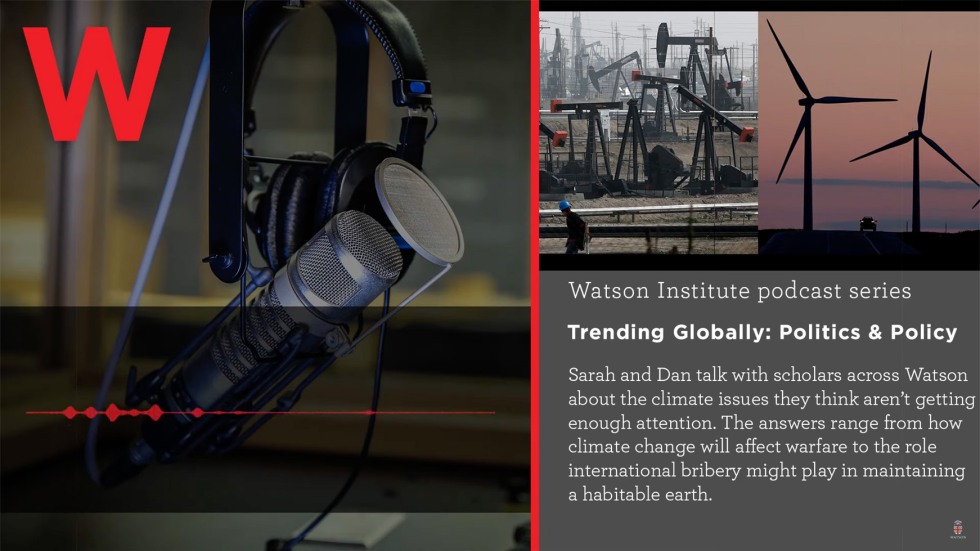This April, join Watson experts for critical climate-related policy conversations on issues that include the viability of soil regeneration, climate change health impacts in the Middle East, and political conflicts around carbon.
Events
Geopolitics of Carbon
WATCH VIDEO
In this special Earth Day Watson Faculty Research Series event, political scientist Jeff Colgan delivers a talk on the Geopolitics of Carbon.
Carbon is an abundant element, but that doesn’t necessarily mean it’s sustainable. Professor Jeff Colgan considers the geopolitics associated with hydrocarbons — especially oil — and greenhouse gases like carbon dioxide. In both cases, carbon can be associated with a lot of political conflict.
This talk was originally delivered for the European Chemical Society (EuCS) conference on April 22, 2021.
Mind the Climate Gap: Is Finance Stepping up on Climate as Governments Fail?
Tuesday, April 20, 2021 5 p.m. – 6:30 p.m.
Over the last decade we have seen governments fail to do what is necessary to address climate change. Emissions continue to rise as governments try and fail to impose climate regulations.
From the Trump administration calling climate a hoax and stepping back from the Paris agreements to the Chinese government allowing unsustainable emissions growth and the UN unable to control country emissions, the world of governments and intergovernmental processes has been powerless to put a dent in global emissions.
Today we are seeing companies and financial institutions try to step in where governments fear to tread. We see Blackrock, the world’s largest asset manager, say they will assess companies on their climate performance, we see banks take on commitments to not finance emitting industries, and even the creation of Climate Venture capital funds.
Will the financial world succeed where governments have failed? Join us for this IBES Discussion on Environment and Society to find out. We will talk to experts in climate policy as well as investors trying to address climate change. Our panelists include: Rodrigo Prudencio (Amazon), Julie Davitz (BNP/Bank of the West), Lila Preston (Generation Investments), Mark Campanale (Carbon Tracker), and Jeff Colgan (Watson Institute). The panel will be moderated by Ricardo Bayon (Encourage Capital).
Climate Change and Global Warming Related to the Middle East
WATCH VIDEO
Nadje Al-Ali, director of the Center for Middle East Studies, hosts this dicussion with Wael Al-Delaimy, Professor of Public Health and Associate Director of the Institute for Public Health at the University of California San Diego and the Chair of the Board of Directors for the Society for Advancement of Science and Technology in the Arab World.
His talk focuses on climate change health impacts in the Middle East and North Africa (MENA) Region, which was the title of a chapter in the above book. The climate change impacts are going to be felt in the MENA region most severely and most early compared to other regions. Yet there is limited data, research, policies, and preparation by the population of the region and their governments. The talk will highlight the risks and the need for regional cooperation to develop adaptation and mitigation initiatives to lessen the impact on an already volatile region in the middle of ongoing conflicts.
"Kiss the Ground" - Screening and Panel Discussion
WATCH VIDEO
Jeff Colgan, director of the Climate Solutions Lab and Richard Holbrooke Associate Professor of Political Science and International and Public Affairs hosts a discussion with Kiss the Ground directors and producers, Josh Tickell and Rebecca Tickell.
Narrated and featuring Woody Harrelson, Kiss the Ground is an inspiring and groundbreaking film that reveals the first viable solution to our climate crisis.
Kiss the Ground reveals that, by regenerating the world’s soils, we can completely and rapidly stabilize Earth’s climate, restore lost ecosystems and create abundant food supplies. Using compelling graphics and visuals, along with striking NASA and NOAA footage, the film artfully illustrates how, by drawing down atmospheric carbon, soil is the missing piece of the climate puzzle.
